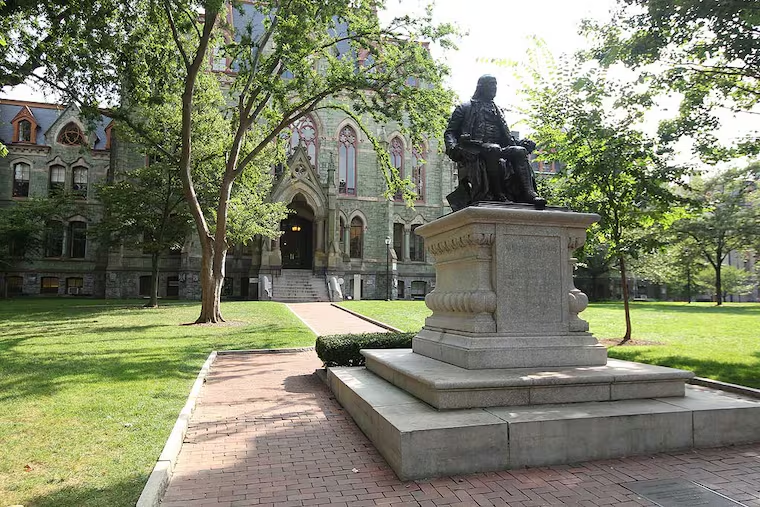Penn will evaluate U.S. News rankings in light of Harvard and Yale’s decision to withdraw
The University of Pennsylvania's law school applauded Yale and Harvard “for their leadership in raising key questions" and said it will evaluate the issue and a process for making a decision.

Harvard and Yale law schools made news Wednesday when they announced their withdrawal from U.S. News & World Report rankings, citing methodology that makes it more difficult for the schools to admit low-income students.
Calling the rankings “profoundly flawed,” Heather K. Gerken, dean of Yale’s Law School, which for years has ranked No. 1, said “they disincentivize programs that support public interest careers, champion need-based aid, and welcome working-class students into the profession.”
The University of Pennsylvania’s law school applauded the universities “for their leadership in raising key questions.” While it has not decided to withdraw, Penn Carey Law in a statement cited problems with the rankings and said it will evaluate the issue and a process for making a decision.
» READ MORE: Temple's former business school dean was sentenced to 14 months in rankings scandal fraud
“While useful in some ways, the rankings don’t provide a clear or complete perspective into institutional priorities for educating future lawyers,” the school said in a statement. “Among the problems with the current system, the U.S. News algorithm severely undercounts money spent on financial aid for students, while fully rewarding schools for every dollar spent on faculty and administrator salaries and other operating expenses. The rankings do not provide a holistic view of how legal education is meeting the needs of today’s society.”
The school noted that it has increased financial aid and support for students pursuing public interest careers.
Widener University said its law school also was reviewing the matter. Other local colleges with law schools did not respond to a request for comment.
Eric Gertler, executive chairman and CEO of U.S. News, defended the rankings in a statement and said they are to help students make the best decision about which school to attend.
“We will continue to fulfill our journalistic mission of ensuring that students can rely on the best and most accurate information in making that decision,” he said. “As part of our mission, we must continue to ensure that law schools are held accountable for the education they will provide to these students and that mission does not change with these recent announcements.”
» READ MORE: Rutgers business school accused of rankings fraud, hiring own grads in temp jobs to boost its scores
U.S. News rankings in recent years have come under criticism for their rankings system and have been spotlighted in cases where schools have been accused of providing false data. Earlier this year, Moshe Porat, the former dean of Temple University’s business school, was sentenced to 14 months in federal prison for his role in a scheme to lie to boost his school’s ranking. And Rutgers University’s business school in lawsuits last spring was accused of submitting false statistics to U.S. News, which it has denied.
Yale was the first to announce its withdrawal from the rankings, which was reported by the Wall Street Journal Wednesday. Harvard followed with its announcement later that day.
“We have reached a point where the rankings process is undermining the core commitments of the legal profession,” Gerken, the dean, said in a statement. “As a result, we will no longer participate.”
She said Yale awards more public interest fellowships than other schools, which allow students to serve their local communities, but U.S. News doesn’t count them.
“These graduates are effectively classified as unemployed,” she wrote.
Among other flaws, she cited the metric that assigns 20% of a law school’s overall ranking to median graduate exam scores and grade point averages.
“While academic scores are an important tool, they don’t always capture the full measure of an applicant,” she said. “This heavily weighted metric imposes tremendous pressure on schools to overlook promising students, especially those who cannot afford expensive test preparation courses. It also pushes schools to use financial aid to recruit high-scoring students. As a result, millions of dollars of scholarship money now go to students with the highest scores, not the greatest need.”